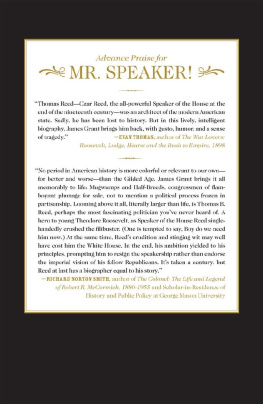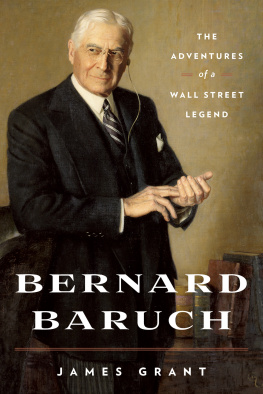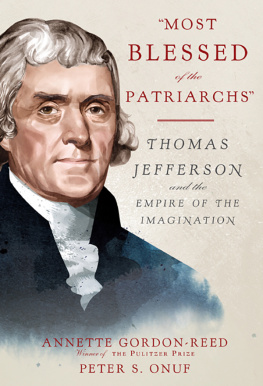
A LSO BY J AMES G RANT
Bernard Baruch: The Adventures of a Wall Street Legend
Money of the Mind: Borrowing and Lending in America from the Civil War to Michael Milken
Minding Mr. Market: Ten Years on Wall Street with Grants Interest Rate Observer
The Trouble with Prosperity: The Loss of Fear, the Rise of Speculation, and the Risk to American Savings
John Adams: Party of One
Mr. Market Miscalculates: The Bubble Years and Beyond

Simon & Schuster
1230 Avenue of the Americas
New York, NY 10020
www.SimonandSchuster.com
Copyright 2011 by James Grant
All rights reserved, including the right to reproduce this book or portions thereof in any form whatsoever. For information address Simon & Schuster Subsidiary Rights Department, 1230 Avenue of the Americas, New York, NY 10020.
First Simon & Schuster hardcover edition May 2011
SIMON & SCHUSTER and colophon are registered trademarks of Simon & Schuster, Inc.
The Simon & Schuster Speakers Bureau can bring authors to your live event. For more information or to book an event, contact the Simon & Schuster Speakers Bureau at 1-866-248-3049 or visit our website at www.simonspeakers.com .
Designed by Paul Dippolito
Manufactured in the United States of America
1 3 5 7 9 10 8 6 4 2
Library of Congress Cataloging-in-Publication Data
Grant, James.
Mr. Speaker! : the life and times of Thomas B. Reed, the man who broke the filibuster / James Grant.
p. cm.
Includes bibliographical references and index.
1. Reed, Thomas B. (Thomas Brackett), 18391902. 2. Legislators
United StatesBiography. 3. United States. Congress. HouseSpeakersBiography. 4. CaliforniaPolitics and government18501950. I. Title.
E664.R3G73 2011
328.73092dc22
[B] 2011002798
ISBN 978-1-4165-4493-7
ISBN 978-1-4516-1109-0 (ebook)
Illustrations courtesy of the Library of Congress with the following exceptions:
Collections of the Maine Historical Society: top
Official Records of the Union and Confederate Navies. (Washington, D.C.: G.P.O, 18961906.) Series I, Vol. 26. Milstein Division of United States History, Local History and Genealogy,
The New York Public Library: top
Ida Hinman, The Washington Sketch Book (Washington, D.C.: Hartman and Cadick, 1895), 3. Milstein Division of United States History, Local History and Genealogy,
The New York Public Library:
For Patricia, who else?
Contents
Preface
T HOMAS B RACKETT R EED was the rock-ribbed Maine Republican who led the U.S. House of Representatives into the modern era of big government. From the Speakers chair early in 1890, he unilaterally stripped the legislative minority of the power to obstruct the law-making agenda of the majority. Enraged Democrats branded him a czar, which epithet Reed seemed not to mind at all.
Modernity was Reeds cause from his first Congress in 1877 to the day he resigned in protest over Americas war of choice with Spain. As society was moving forward, he contended, so must the government and the laws. That meant, for instance, the abolition of capital punishment, a cause he championed while representing Portland in the Maine legislature immediately following the Civil War. On the national stage, it meant protective tariffs, peace, womens suffrage, federally protected voting rights for African-Americans and a strong navy. He heaped ridicule on the Democrats for their Jeffersonian insistence on strictly limited federal powers. The tragedy of Reeds political life was that the government he helped to cultivate and finance turned warlike and muscular, just as his Democratic antagonists had predicted it would. His friend and onetime protg Theodore Roosevelt rode that trend into the history books. Reed, heartsick, retired to Wall Street to practice law.
Peace and prosperity make a superior backdrop to everyday living, but they do not necessarily commend an era to the readers or writers of history. Not that either Reeds life (18391902) or his times were anything but eventful. Boom and bust, free trade or protection, race, the rights of subject peoples and the relationship between the individual and the state were the staple points of conflict during his quarter-century in politics.
Czar Reed had a suitably tyrannical presence, standing well over six feet tall and weighing close to 300 pounds. He married a clergymans daughter, Susan P. Jones, who opposed womens suffrage; Katherine, their daughter, lived to advocate it. Reeds eyes beamed with intelligence but his massive face was bland enough to stump the portraitist John Singer Sargent. Well, Reed quipped as he beheld the painters failed likeness of himself in 1891, I hope my enemies are satisfied.
The party labels of Reeds day may seem now as if they were stuck on backwards. At that time, the GOP was the party of active government, the Democratic party, the champion of laissez-faire. The Republicans sage was Alexander Hamilton, the Democrats, Thomas Jefferson. The Republicans condemned the Democrats for their parsimony with public funds, the Democrats arraigned the Republicans for their waste and extravagance. And what, in those days, constituted extravagance in federal spending? Arguing in support of a bill to appropriate funds for a new building to house the overcrowded collection of the Library of Congress, Reed had to answer critics who charged that Congress should do without the books rather than raid the Treasury and raise up one more imperial structure to crowd the capital citys already grandiose thoroughfares.
The library fight was waged with words, but the politics of Reeds time were shockingly violent. It was embarrassing to Reed to have to try to explain away to his congressional colleagues the near war that erupted in his home state over the stolen 1879 Maine gubernatorial election. Reed had grown used to political bloodshed in the conquered South, but even he, worldwise as he was, had never expected the descendants of the Puritan saints to have to call out the militia to get an honest count of a New England vote. Meanwhile, in Washington, on the floor of the House of Representatives, ex-soldiers would put aside public business to hurl charges and countercharges over the wartime atrocities at Andersonville or Fort Pillow. Reed himself was not above the occasional jibe at the ex-Confederateswaving the bloody shirt, this style of political discourse was calledbut he affected not one jot of martial vainglory. A supply officer aboard a Union gunboat on the Mississippi River in the final year of the war, he drew no fire except the verbal kind from his own commanding officer.
As a professional politician, Reed could talk with the best of them. In the House, he was the acknowledged master of the impromptu five-minute speech and of the cutting, 10-second remark. He talked himself into 12 consecutive congresses, including three in which he occupied the Speakers chair. The gentleman neednt worry. He will never be either, he once remarked to a Democrat who was rash enough to quote Henry Clays line about rather being right than president.
Reeds wit was his bane and glory. An acquaintance correctly observed that he would rather make an epigram than a friend. Too often, he made an epigram and an enemy. They can do worse, he said of the Republicans who were sizing him up for the GOP presidential nomination in 1896. And they probably will, he added prophetically. In the museless and pleasant William McKinley, the Republicans did, in fact, do much worse. Mark Hanna, McKinleys strategist and the first of the modern American political kingmakers, set his agents to mingle in the western crowds that Reed sought to charm in the 1896 campaign season. There was nothing Lincolnian about Reed, obese, dapper and sarcastic, Hannas biographer recorded. He wasnt too friendly when they came up to shake hands after meetings. He was an Eastern Product.
Next page

















